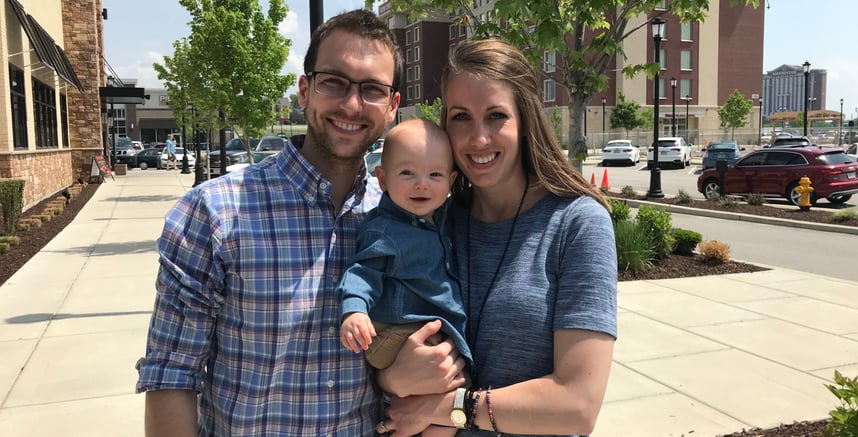Life is full of milestones, turning points and new chapters. Some are more difficult than others, but they all lead to growth and another step in our journeys.
For the second part of our “Life in Transition” series, we asked Sara Gelsheimer and Jamie Cailteux to share their advice—financial and otherwise—for planning for children and college. We hope their thoughts resonate with you and encourage you to take on whatever transitions you’re currently facing.
(Missed Part 1: How to Plan for Marriage? Click here.)
Having Kids: You’re Not Alone
Sara Gelsheimer, Wealth Manager and InspireHer Founder

What did you find most challenging about being a new mom?
After I had my son, I cried at least once a day for weeks. I thought something was wrong with me, and it made me question whether I was a good mom. It felt like the life that my husband and I had and all the freedom we had was gone.
But I learned that what I experienced is completely normal, and I was not alone. What I was going through was just growing pains, and what my life become on the other side of those tears is beautiful. I also know that there is strength in sharing what I went through with others.
What are some financial aspects connected to having a child that seemingly pulled the rug from under you or where unexpected?
Daycare is a HUGE expense, and in some cases can be as much as a second mortgage. If you are considering day care one day, I would recommend setting up a savings account now and putting money toward those expenses (even if you don’t have a child yet). It will help you in the long run to get used to parting with that money each month.
What is the best financial decision you made?
Being financially ready before having a child. Also, it was important to remember to add my son to my health insurance within the allotted time (in my case, it was 30 days after my son was born). I also checked if my employer had a flex savings for dependent care which allows you to put away part of your paycheck tax-free for childcare expenses (IRS regulations allow up to $5,000/family/year).
What is the best financial resource that helped you that you wish more women had access to?
Connecting with a financial planner. They can really help you prioritize your savings and optimize your financial goals, which allows you to have peace of mind and spend it on the things you truly care about.
What advice would you give to women considering having a child?
It’s never too early to start planning. Look into your company’s maternity leave policy, and get a good handle on your expenses. I did a blog on some things to consider financially: https://www.plancorp.com/blog/full-hearts-dont-mean-empty-wallets
Finally, it’s important to remember that all babies are different, and you’ll need to find your own balance and what works for you. Remember, babies are resilient, and you can’t break them! When my son first started learning to crawl and climb on things, I would get so worried when he would fall, but now I know that it’s part of the process.
Planning for College: Start Early
Jamie Cailteux, Family Office Assistant
.jpg?width=3000&name=IMG_2555%20(1).jpg)
What’s something you wish you knew before you started planning for your children’s college?
How complicated the process has become. There is a lot more to the application process than just filling it out. You need essays, service hours, etc.
Start thinking about college during your child’s freshman year, and make sure you’re aware of the different course requirements for each college (e.g., four years of a foreign language). We used College Board, Naviance and specific colleges’ websites.
What piece of advice would you give to families starting to plan for college?
Make sure your child gets as many college credits as she can in high school (via AP courses, 1818, etc.).
What’s the best piece of advice you received?
To go with a public university. It’s more economical, and success comes from the individual—not the college she attended.
Are there any financing resources that helped you that you wish more parents had access to?
My529 plans that can be used at any university.
Did you encounter any misconceptions about planning for college, and what changed your mind?
That high school counselors will take your student through the college application process and make sure she’s taking the required courses. In reality, that’s not the case. The student needs to do her own research.
If you could change anything, would you?
I’d start earlier on saving and planning. College tuition is ridiculous today, and the earlier you start saving, the more time your money has to grow.
This post was written by a member of InspireHer, Plancorp’s Women’s Initiative, which strives to advocate for clients and women in the community by addressing topics specific to their financial lives. For more information about InspireHer and how you can get involved, email inspireher@plancorp.com.








